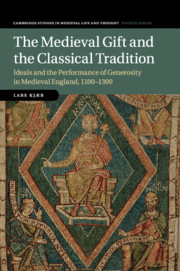Refine search
Actions for selected content:
2 results
Chapter 5 - Sanctifying Generosity
-
- Book:
- The Medieval Gift and the Classical Tradition
- Published online:
- 10 August 2019
- Print publication:
- 29 August 2019, pp 98-120
-
- Chapter
- Export citation

The Medieval Gift and the Classical Tradition
- Ideals and the Performance of Generosity in Medieval England, 1100–1300
-
- Published online:
- 10 August 2019
- Print publication:
- 29 August 2019
